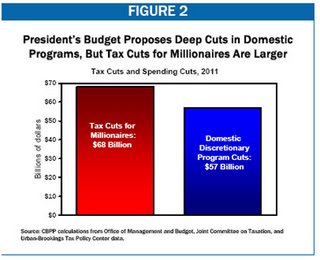
I tried to do this earlier and Blogger ate the post, which made me so mad I literally threw a temper tantrum, screaming and stamping my feet. This time I am doing what I usually do—writing the thing in Word first—so if I lose it, it won’t be gone forever.
Ok. As background, a few months ago I
fretted that
V for Vendetta, one of my favorite comics of all time, would be ruined in its movie adaptation by Natalie Portman’s limited acting skills. Well, I saw it (on opening night, of course), and actually, it was ok. Natalie Portman does do one of the worst British accents ever committed to celluloid, but for the star of the film she has surprisingly few lines, and the accent mostly distracts from her usual lack of affect, so it works out.
The reviewers mainly seem annoyed that they have to write about the movie at all.
Manohla Dargis does one of those typical
Times too-snarky-to-make-any-damn-sense things, and
J. Hoberman could use a topic sentence and an editor who’s not afraid of him.
Both include some version of the argument that, as Dargis puts it, “Notably, Mr. Moore is having nothing to do with the film.” If she would read
her own paper’s reporting on the subject she’d know that in fact, following the bad to abysmal adaptations Hollywood has done of his comics in the past (
From Hell and
The League of Extraordinary Gentlemen respectively), Moore had decided he wanted nothing to do with Hollywood in general, and never wanted this movie made. He has distanced himself from
V for Vendetta for reasons having nothing to do with how faithful it is or isn’t to his original vision.
In fact, I have read the comic many times, and I think the movie is one of the more faithful adaptations I’ve ever seen of any piece of literature. Directors always seem to feel the need to monkey around with stories they’ve bought or been given (and their changes are nearly always for the worse), but while the Wachowskis did make some minor changes (all for the worse, of course), they didn’t actually screw with the main storyline in any significant way. In fact, much of what feels stale about the movie is in fact a faithful reproduction of the comic—the reliance on literal jackboots and black uniforms. Moore and Lloyd’s vision was a post-nuclear, Thatcherite fantasy; a director in 2006 could have done more to reimagine the rhetoric and social controls that might emerge in a post-Blair (or post-Bush) state following the kind of faked terrorist attacks they’ve used to replace nuclear war.
The politics may get some media play, but that’s the one place the Wachowskis really did pussy out. The original comic was a full-throated anarchist polemic: the fascist state was to be replaced with no state. I guess having a “terrorist” hero was as much as Hollywood could handle.
PS: The world of the movie
V for Vendetta is also totally desexualized: in the comic, Evey (the Natalie Portman character) has a sexual relationship with a much older man and is on her way to turn tricks in the opening scene. In the movie, she is on her way to meet that much older man, not turn tricks, only he's gay and has no interest in sleeping with her. This
is a major loss, because one of the interesting things about the comic is Moore's insight into the relationship between fascism and sex, power and eroticism, and especially surveillance and voyeurism. Given the
obvious sexual tinge of our current slide toward lite fascism, I do wish the Wachowskis had been a lot less prudish.
PPS: I was waiting for a certain someone to say this in a comment, but it doesn't look like she's going to get around to it, and I want it up before this post gets bumped off the front page: The worst decision the Wachowskis made was the march at the end with all the people in V costumes. Apart from being a really dumb "I am Spartacus" moment, it also totally undermines the original anarchist vision to have everybody in a goddamned uniform. Is the way to overthrow a fascist state really supposed to be
more unwavering conformity?
Tags:
comics,
culture,
V For Vendetta,
Natalie Portman,
Alan Moore,
Wachowski Brothers








 An example of capitalist reappropriation of a great protest song is "Rich Girl" by that
An example of capitalist reappropriation of a great protest song is "Rich Girl" by that 


.jpg)




















